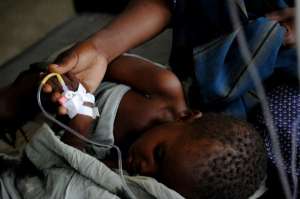
A Somali child is looked after by her mother. (Photo: Roberto Schmidt / AFP / Getty Images)
As I’ve written before, the devastating famine in Somalia—which has killed tens of thousands in the Horn of Africa—may have been triggered by the worst drought in the region in 60 years, but it’s ultimately a manmade disaster. The ongoing insurgency in Somalia prevented food aid from reaching those in desperate need, and now the New York Times is reporting that emergency aid is being stolen by corrupt contractors. The lack of rain began the famine, but humans have made it a disaster.
Now they’re making it worse. Beyond the risk of starvation, there are now reports that cholera and measles are running rampant in the refugee camps in Ethiopia and Kenya, where hundreds of thousands of desperate Somalis have fled. From the Guardian:
More from TIME: Dispatch from Mogadishu
In just one hospital in Mogadishu, there have been 4,272 recorded cases of acute watery diarrhoea, a key indicator of the risk of cholera, causing 181 deaths. Most of those who have died were aged under five. Laboratory tests conducted on a sample of the cases this week suggested 60% of the infections were cholera.
While Somalia has experienced seasonal cholera outbreaks in recent years, this one is much worse. “The number of cases is two or even three times what was there last year,” Dr Michel Yao, WHO’s public health adviser, said in Geneva on Friday. “So we can say that we have an epidemic of cholera going on.”
Both cholera and measles are easily preventable—there’s a vaccine for measles—but in the crowded and often unsanitary conditions of a temporary camp populated by thousands of already weakened refugees, the diseases can spread rapidly. Cholera in particular—which spreads via contaminated water—can move quickly and kill in a matter of days.
Video from TIME: How a Drought Became a Famine in Somalia
What’s frustrating is that these diseases—and these deaths—are not inevitable. In the aftermath of the horrific Asian tsunami in 2004, hundreds of thousands of homeless survivors were forced to live in dense refugee camps. UN officials warned that the toll from diseases like cholera and diarrhea could rival that of the tsunami itself. But for the most part, those lethal outbreaks never materialized, thanks to a massive prevention effort on the part of NGOs and the international community. Experts in the emerging field of emergency public-health quickly ensured a regular supply of clean drinking water and sanitation, while epidemiologists stepped in to keep a close record of any potential outbreaks. That early warning system enabled doctors to prevent a few scattered cases of cholera from becoming a mass killer. The Asian tsunami was a natural catastrophe, but we prevented it from becoming a far worse manmade one.
Sadly, the success of the tsunami response hasn’t always been replicated. Thousands have died from persistent cholera outbreaks in Haiti since the 2010 earthquake, the response hampered the sheer amount of destruction on the ground and the lack of a viable local medical system. Though the UN refugee agency is taking steps to slow the spread of disease in the camps—launching an emergency measles vaccination program—any plans to move refugees to better-equipped settlements depends on the permission of the Kenyan government, which has little desire to host hundreds of thousands of starving Somalis. The rest of us are doing far too little—Rashid Abdi of the International Crisis Group calls the famine “a collective failure of the international community.”
More from TIME: Famine in Somalia: When does the World Use the “F” Term?
Admittedly, the political problems of the Horn of Africa are difficult to untangle, and the ongoing conflict in Somalia is far removed from the cease-fires that the 2004 tsunami caused in hard-hit countries like Sri Lanka and Indonesia. After the fiasco of Blackhawk Down in 1993, there’s next to no chance of ever seeing an American soldier step foot in Mogadishu on a humanitarian mission, even though we seem to have become inured to casualties elsewhere in a way that would have seemed unthinkable 18 years ago. I don’t know how to halt the landslide of death underway in Somalia—though charitable donations are a start—but I know that we could do it, if we really wanted to.
Bryan Walsh is a reporter at TIME. Find him on Twitter at @bryanrwalsh. You can also continue the discussion on TIME’s Facebook page and on Twitter at @TIME


